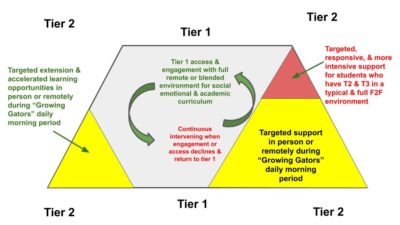

When it comes to educating our children, many educators believe that all students can be successful given access to the right resources, proper support, and strong foundational relationships with parents, teachers, and other adults.
After years of study, this is not rocket science. Teacher expectations, individualized and differentiated instruction, social-emotional learning, and other instructional methods and tools also play key roles in strong outcomes.
With all of that understood, what happens when not all students have access to the necessary resources?
In this time of COVID-19, we are seeing that reality play out when it comes to one critical resource — internet access.
Without access to a reliable internet connection, many students face the prospect of being left behind. Strong broadband networks, and universal access to them, are no longer a luxury. They are a necessity.
The global pandemic has spotlighted this fundamental need. In a world where online learning has become a de facto new norm, students require access to computers, affordable service, and communities that have the infrastructure required to deliver reliable and fast internet connections. Take away one component of this equation, and the others become useless.
As we look at the digital divide in the state, educators have been forced to scramble to find solutions to try to get around this deficit in reliable connectivity. This should not be the case 25 years into the Internet Age.
While Federal Communication Commission maps shows 7% of North Carolinians without access to internet meeting the speed thresholds defined as “broadband,” it has been well-documented that the maps are bad, the underlying data is bad, and the scope of the problem is hugely underestimated.
Whatever the exact number, hundreds of thousands of North Carolina lack basic and reliable internet access.
In this public health crisis, the result is that an already disgraceful achievement gap, rooted in race and class-based economic disparities, is inevitably being widened by a connectivity gap.
This situation needs to be treated as the educational crisis that it is.
In Cabarrus County, educators, technology facilitators, and district leaders are working collaboratively to accelerate the deployment of free, reliable Wi-Fi hot spots. Educators are working as leaders on the front lines by connecting with students to help them with internet access.
But this is an issue affecting all areas of the state — urban, rural, and in between. We need a comprehensive, statewide approach that brings everyone to the table using all available resources, and we need state leadership that backs that kind of approach.
When large, incumbent telecommunications providers push against the use of public resources in helping to meet this challenge, they are harming our most precious resource – our children. It is not acceptable.
This pandemic provides educators, community stakeholders, and public- and private-sector leaders an opportunity to right systemic wrongs and open the digital world to our most vulnerable populations. For that to happen, investment, innovation and efficient use of resources at the local and state level are required.
Together, North Carolina can bridge the connectivity gap and lead the way where everyone is equipped to not only participate in the digital age, but to thrive.







